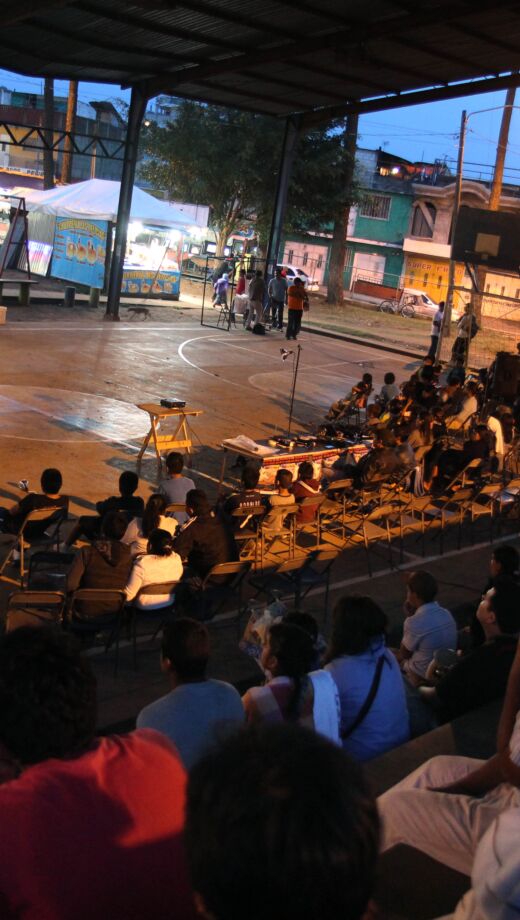
Supported projects 2020
To promote the screenings of human rights cinema worldwide, Movies that Matter offers grants to human rights film events in Africa, Asia, Latin America, the Middle East and Eastern Europe, especially in countries with limited resources and freedom of press. These events can take various forms, such as human rights film festivals, LGBTI film festivals and mobile cinema projects.
Supported projects 2020
-
Argentina – Vecine Fiorito – Festival de Cine de Derechos Humanos
September 2021
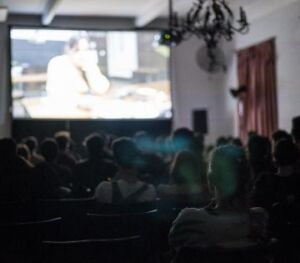 The first edition of Vecine Fiorito – Festival de Cine de Derechos Humanos will be a community film festival in Villa Fiorito, a poor neighbourhood in the south of Buenos Aires. It is a free-access event that aims to create a space for reflection and debate on human rights issues, mainly related to gender and gender-based discrimination. The programme consists of seven films, one of which will receive the audience award. The festival, which is a collaborative project between Argentinean organisations El Hormiguero, Vecine Festival and Belleza Fiorito, targets the entire community of Villa Fiorito, but has a specific focus on youth, young mothers and young families. Due to the COVID pandemic it has been postponed from March to September.
The first edition of Vecine Fiorito – Festival de Cine de Derechos Humanos will be a community film festival in Villa Fiorito, a poor neighbourhood in the south of Buenos Aires. It is a free-access event that aims to create a space for reflection and debate on human rights issues, mainly related to gender and gender-based discrimination. The programme consists of seven films, one of which will receive the audience award. The festival, which is a collaborative project between Argentinean organisations El Hormiguero, Vecine Festival and Belleza Fiorito, targets the entire community of Villa Fiorito, but has a specific focus on youth, young mothers and young families. Due to the COVID pandemic it has been postponed from March to September. -
Belarus – film screenings
March – June 2021
 In Belarus, where freedom of expression and freedom of peaceful assembly are both severely restricted, it is not safe and easy to organise film screenings about human dignity and human rights. Yet this is exactly what the organisers of this (anonymous) initiative in Belarus did. Screenings took place both in cinemas and cultural centres in different parts of the country. In Belarus, most of the media is state-owned, and non-state media are tightly controlled by the government. Therefore, this film festival in Belarus was not only a hangout or party, but also harbour for intellectual exchange and activism. The festival was held in 6 different cities in Belarus and was attended by over 1600 people.
In Belarus, where freedom of expression and freedom of peaceful assembly are both severely restricted, it is not safe and easy to organise film screenings about human dignity and human rights. Yet this is exactly what the organisers of this (anonymous) initiative in Belarus did. Screenings took place both in cinemas and cultural centres in different parts of the country. In Belarus, most of the media is state-owned, and non-state media are tightly controlled by the government. Therefore, this film festival in Belarus was not only a hangout or party, but also harbour for intellectual exchange and activism. The festival was held in 6 different cities in Belarus and was attended by over 1600 people. -
Bolivia – Festival Internacional de Cine de La Paz
2 November – 10 December 2020
 The 5th edition of this festival took place in La Paz and other regions in Bolivia. The film programme was complemented with Q&As, workshops and masterclasses with (local) human rights partners. Screenings took place in different places such as Universities and locations of the Municipalities. Vulnerable and rural populations were the festival’s main target group, in addition to the culturally deprived population. The organisation aimed to provide a space of reflection and cultural development, by screening socially committed and award-winning films, and invited human rights defenders at festival screenings from all over the country. In total, more than 2000 people visited the festival.
The 5th edition of this festival took place in La Paz and other regions in Bolivia. The film programme was complemented with Q&As, workshops and masterclasses with (local) human rights partners. Screenings took place in different places such as Universities and locations of the Municipalities. Vulnerable and rural populations were the festival’s main target group, in addition to the culturally deprived population. The organisation aimed to provide a space of reflection and cultural development, by screening socially committed and award-winning films, and invited human rights defenders at festival screenings from all over the country. In total, more than 2000 people visited the festival. -
Brazil – Mostra Taturana de Cinema – 2021 pela Democracia
September – December 2021
 The 2nd edition of the Taturana human rights film festival took place in six venues across the city of Sao Paulo, including cultural centres, cinemas and public schools. With this film festival the organisation intended to broaden the urgent dialogue on democracy and institutional racism in Brazil, including debates with black leaders and intellectuals from diverse fields of study. Furthermore, 23 documentaries were selected by the curators: 17 short films and 6 feature films, all by Black or Indigenous filmmakers. Mostly produced in Brazil, but also from Portugal, Angola and Kenya. Using their extensive network, the organisation ensured a travelling festival in a self-managed and decentralised way throughout the country, creating spaces for dialogue with a diverse audience.
The 2nd edition of the Taturana human rights film festival took place in six venues across the city of Sao Paulo, including cultural centres, cinemas and public schools. With this film festival the organisation intended to broaden the urgent dialogue on democracy and institutional racism in Brazil, including debates with black leaders and intellectuals from diverse fields of study. Furthermore, 23 documentaries were selected by the curators: 17 short films and 6 feature films, all by Black or Indigenous filmmakers. Mostly produced in Brazil, but also from Portugal, Angola and Kenya. Using their extensive network, the organisation ensured a travelling festival in a self-managed and decentralised way throughout the country, creating spaces for dialogue with a diverse audience. -
Colombia – Films for Human Rights
October 2020
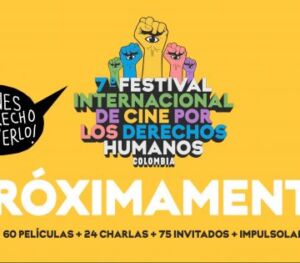 Films for Human Rights is a digital platform for the circulation and exhibition of human rights films and audiovisual content in Colombia and Latin America. The platform aims to encourage active participation of civil society, the state and international cooperation. Confronted with many cases of human right violations in Colombia, the organisation uses the power of cinema to change paradigms, imaginaries and to build memories. Raising awareness among the Colombian population, through the screen, becomes essential. The platform was launched in October 2020. In addition to 4570 film views via the platform, the online “talks that unite” were watched via Facebook 94.000 times.
Films for Human Rights is a digital platform for the circulation and exhibition of human rights films and audiovisual content in Colombia and Latin America. The platform aims to encourage active participation of civil society, the state and international cooperation. Confronted with many cases of human right violations in Colombia, the organisation uses the power of cinema to change paradigms, imaginaries and to build memories. Raising awareness among the Colombian population, through the screen, becomes essential. The platform was launched in October 2020. In addition to 4570 film views via the platform, the online “talks that unite” were watched via Facebook 94.000 times. -
Colombia – International Environmental Film Festival of Cali (FINCALI)
23 to 30 July 2021 – Palmira, 2 to 14 August 2021 – Cali
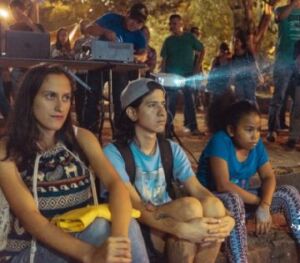 The 4th edition of the bi-annual FINCALI about environmental issues took place in a hybrid form in July and August 2021. Digital film screenings were presented through the digital space “Pantalla Verde / Green Screen”. Physical screenings took place at halls, auditoriums and in the open air in the cities of Cali and Palmira. Following the screenings, various conversations were held with filmmakers and researchers related to the themes or the production of the films. The festival screened more than 50 films, of which 18 were Colombian films. In total, more than 9000 people attended the festival activities of FINCALI.
The 4th edition of the bi-annual FINCALI about environmental issues took place in a hybrid form in July and August 2021. Digital film screenings were presented through the digital space “Pantalla Verde / Green Screen”. Physical screenings took place at halls, auditoriums and in the open air in the cities of Cali and Palmira. Following the screenings, various conversations were held with filmmakers and researchers related to the themes or the production of the films. The festival screened more than 50 films, of which 18 were Colombian films. In total, more than 9000 people attended the festival activities of FINCALI. -
Colombia – Muestra Itinerante de Cine Africano (MUICA)
May 2021 – March 2022
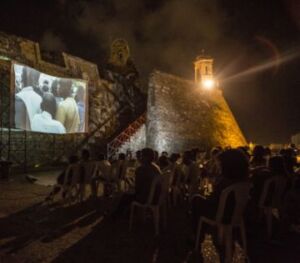 MUICA is a bi-annual African Film Festival in Cartagena, Bogotá and Cali screening African films. The 4th edition took place both online and offline. In the end 20 films were screened online and 10 discussion were organised reaching a total number of 27.388 viewers were reached. Between May 2021 and March 2022 in seven Colombian cities 90 physical screenings were organised, followed by discussions as well. Screenings took place cinemas, cultural centres, libraries, universities, schools and working-class neighbourhoods in each city. The festival was organised by Otro Sur, a non-profit association promoting cultural exchange between Africa and Latin America.
MUICA is a bi-annual African Film Festival in Cartagena, Bogotá and Cali screening African films. The 4th edition took place both online and offline. In the end 20 films were screened online and 10 discussion were organised reaching a total number of 27.388 viewers were reached. Between May 2021 and March 2022 in seven Colombian cities 90 physical screenings were organised, followed by discussions as well. Screenings took place cinemas, cultural centres, libraries, universities, schools and working-class neighbourhoods in each city. The festival was organised by Otro Sur, a non-profit association promoting cultural exchange between Africa and Latin America. -
Indonesia – 100% Manusia Film Festival
3-10 December 2020
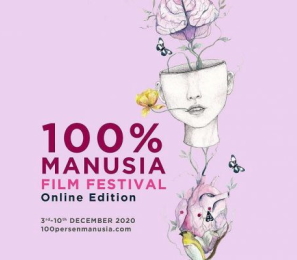 The 4th edition of the 100% Manusia Film Festival (100% Human Film Festival) should have contained screenings in Jakarta, Tangerang, Bekasi and Depok. However, instead of screenings in cultural centres, co-working spaces, art houses and universities, the screenings were held 100% online. The festival’s theme is ‘Courage’, with high-quality films that encourage people to stand up and speak out. 100% Manusia aims to release all individuals from stereotypes and prejudices. As the festival would like to be accessible to all layers of society, all film screenings and fringe events were free of charge, some films were subtitled in Indonesian and several talks were interpreted with sign language. Almost 7000 visitors watched films and attended online festival events.
The 4th edition of the 100% Manusia Film Festival (100% Human Film Festival) should have contained screenings in Jakarta, Tangerang, Bekasi and Depok. However, instead of screenings in cultural centres, co-working spaces, art houses and universities, the screenings were held 100% online. The festival’s theme is ‘Courage’, with high-quality films that encourage people to stand up and speak out. 100% Manusia aims to release all individuals from stereotypes and prejudices. As the festival would like to be accessible to all layers of society, all film screenings and fringe events were free of charge, some films were subtitled in Indonesian and several talks were interpreted with sign language. Almost 7000 visitors watched films and attended online festival events. -
India – The Outsider Moving Art & Film Festival
September – November 2021
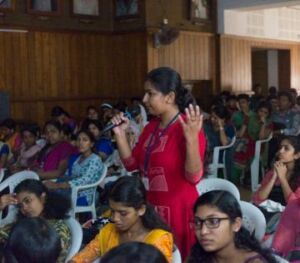 At the brand new The Outsider Moving Art & Film Festival an array of identities will be explored through film screenings, interactive performances, workshops, conferences and debates. While India prohibits discrimination based on class, religion or gender, reality is different. The festival raises awareness and makes space for dialogue about human rights issues, including gender-based discrimination, social inequality and freedom of religion. By travelling to eight different towns in Uttar Pradesh and Rajasthan, combined with ten spontaneous stops, the mobile festival expects to reach a wide and diverse audience of more than 5000 people. The festival is organised by the NGO Hers is Ours.
At the brand new The Outsider Moving Art & Film Festival an array of identities will be explored through film screenings, interactive performances, workshops, conferences and debates. While India prohibits discrimination based on class, religion or gender, reality is different. The festival raises awareness and makes space for dialogue about human rights issues, including gender-based discrimination, social inequality and freedom of religion. By travelling to eight different towns in Uttar Pradesh and Rajasthan, combined with ten spontaneous stops, the mobile festival expects to reach a wide and diverse audience of more than 5000 people. The festival is organised by the NGO Hers is Ours. -
Israel – Tishreen Film Festival
March – June 2021
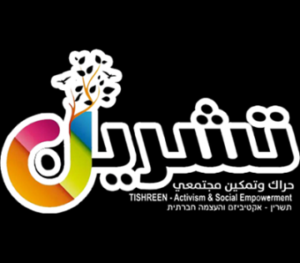 Tishreen Film Festival, the first film festival in the Triangle Area, is a festival that promotes grassroots activism and focuses on women’s rights and the Palestinian-Arabic community living in the Triangle Area. During the first edition of their festival in 2021, they organised 9 screenings in Tishreen’s own cultural space, the Alternative Space, and 12 screenings in elementary and high schools and for members of the school parliaments. In addition, the festival organised a special screening for women in Haifa together with feminist organisations. Besides film screenings, 18 discussions with film directors, film makers and (law) experts were organised in the Alternative Space and in schools.
Tishreen Film Festival, the first film festival in the Triangle Area, is a festival that promotes grassroots activism and focuses on women’s rights and the Palestinian-Arabic community living in the Triangle Area. During the first edition of their festival in 2021, they organised 9 screenings in Tishreen’s own cultural space, the Alternative Space, and 12 screenings in elementary and high schools and for members of the school parliaments. In addition, the festival organised a special screening for women in Haifa together with feminist organisations. Besides film screenings, 18 discussions with film directors, film makers and (law) experts were organised in the Alternative Space and in schools. -
Kazakhstan – Qara Film Festival
May/June 2021
 Qara Film Festival is an independent documentary film festival in Kazakhstan. Intending to challenge the cultural separation between Russian- and Kazakh-speaking audiences, the festival initiates open discussions on pressing issues by screening human rights films. 10 feature-length documentaries were shown during the 2nd edition of the festival, both online and offline, reaching more than 3800 visitors in total. Following the screenings, various debates were organised discussing themes such as family trauma, challenges of fatherhood/motherhood, mascunility and brotherhood. To strengthen the Kazakh film production climate, this year also marked the launch of a pitching event for local filmmakers.
Qara Film Festival is an independent documentary film festival in Kazakhstan. Intending to challenge the cultural separation between Russian- and Kazakh-speaking audiences, the festival initiates open discussions on pressing issues by screening human rights films. 10 feature-length documentaries were shown during the 2nd edition of the festival, both online and offline, reaching more than 3800 visitors in total. Following the screenings, various debates were organised discussing themes such as family trauma, challenges of fatherhood/motherhood, mascunility and brotherhood. To strengthen the Kazakh film production climate, this year also marked the launch of a pitching event for local filmmakers. -
Kenya – Under Our Skin International Film Festival on Human Rights
16 – 25 July 2021
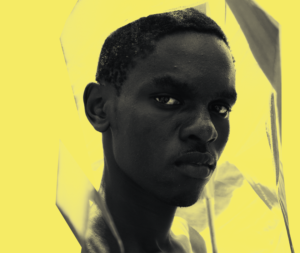 The 1st edition of the Under Our Skin International Film Festival on Human Rights took take place in the capital Nairobi in July 2021 and near the coast in Kilifi in November 2021. In total 30 films were presented in cultural hubs, universities and in communities, almost all followed by panel discussions and Q&A’s. The festival managed to attract a diverse audience from both the middle class urban crowd, students and youth and women and girls. Thematically the festival focused on expression as right, social contract redefined, and injustice by design. Screenings were also organised in the informal settlement Mathare.
The 1st edition of the Under Our Skin International Film Festival on Human Rights took take place in the capital Nairobi in July 2021 and near the coast in Kilifi in November 2021. In total 30 films were presented in cultural hubs, universities and in communities, almost all followed by panel discussions and Q&A’s. The festival managed to attract a diverse audience from both the middle class urban crowd, students and youth and women and girls. Thematically the festival focused on expression as right, social contract redefined, and injustice by design. Screenings were also organised in the informal settlement Mathare. -
Mexico – Humano Film Festival
10-13 September 2020
 The Humano Film Festival is held in the city of Tijuana, a city built on migrants from all over the world. The second edition of this film festival aims to reach a large audience, focusing on those with limited access to education, culture and other fundamental rights. Humano Film Festival takes place in three areas of Tijuana, and involves screenings near the frontier fence and the public beach, as well as public basketball courts. With film screenings, debates, a health fair, a film production competition and other activities, the festival aims to spark awareness and discussion on human rights among approximately 2500 visitors.
The Humano Film Festival is held in the city of Tijuana, a city built on migrants from all over the world. The second edition of this film festival aims to reach a large audience, focusing on those with limited access to education, culture and other fundamental rights. Humano Film Festival takes place in three areas of Tijuana, and involves screenings near the frontier fence and the public beach, as well as public basketball courts. With film screenings, debates, a health fair, a film production competition and other activities, the festival aims to spark awareness and discussion on human rights among approximately 2500 visitors. -
Mexico – International Film Fest with Gender Perspective (MICGénero)
10 September – 4 October 2020
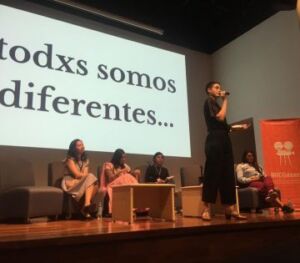 The 9th edition of MICGénero will be held online. The festival, focusing on gender and human rights, aims to reach 30.000 views. Alongside documentaries, fiction short and feature films, the festival will feature Q&As with filmmakers and ‘100 hours of activism’, a programme in which public officials, NGOs, activist and academics are invited to donate an hour of their time and talk about the films, thus generating spaces for discussion on human rights. Furthermore, the festival will feature online workshops, masterclasses and conferences, all of them focusing on subjects related to gender perspective and human rights.
The 9th edition of MICGénero will be held online. The festival, focusing on gender and human rights, aims to reach 30.000 views. Alongside documentaries, fiction short and feature films, the festival will feature Q&As with filmmakers and ‘100 hours of activism’, a programme in which public officials, NGOs, activist and academics are invited to donate an hour of their time and talk about the films, thus generating spaces for discussion on human rights. Furthermore, the festival will feature online workshops, masterclasses and conferences, all of them focusing on subjects related to gender perspective and human rights. -
Moldova – MOLDOX Bridges
March 2021

MOLDOX Bridges is the spin-off of the annual MOLDOX documentary festival in Cahul, Southern Moldova. The film festival took place in Ungheni from 17 till 19 September. By screening 15 high-quality documentaries in this peripheral town, MOLDOX Bridges increased public awareness and debate about urgent social topics. In addition, the screenings were complemented by debates, Q&A sessions, and documentary filmmaking workshops. During the filmmaking workshops the participants managed to create 2 short films on topics of local importance that were screened on the closing day of the festival.
-
Niger – FIFIDHO Caravan of Awareness
15 September – 25 October 2020
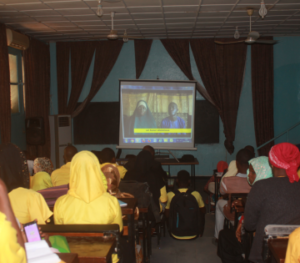 In Niger, a mobile film festival on human rights will be held in 30 villages in the Tillabéry region and 30 colleges in and around the capital Niamey. As elections are coming up in Niger, the organisation FIFIDHO wants to make people conscious of their electoral rights and freedoms and raise attention to the malpractice of ‘buying votes’ in rural areas. Other topics include forced marriage and girls’ rights to education. By travelling through the region and setting up daily film screenings for more than a month, the organisers expect to reach 45,000 people. The project will be followed by the annual FIFIDHO International Human Rights Film Festival in Niamey and Maradi.
In Niger, a mobile film festival on human rights will be held in 30 villages in the Tillabéry region and 30 colleges in and around the capital Niamey. As elections are coming up in Niger, the organisation FIFIDHO wants to make people conscious of their electoral rights and freedoms and raise attention to the malpractice of ‘buying votes’ in rural areas. Other topics include forced marriage and girls’ rights to education. By travelling through the region and setting up daily film screenings for more than a month, the organisers expect to reach 45,000 people. The project will be followed by the annual FIFIDHO International Human Rights Film Festival in Niamey and Maradi. -
Philippines – Active Vista International Human Rights Film Festival
20-26 September 2020
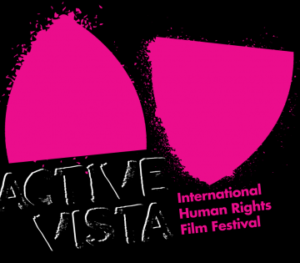 Given the restrictions on physical gatherings because of the pandemic, the 8th edition of the Active Vista Human Rights Film Festival was held entirely online through Facebook, Zoom, and Eventive. The film programme included celebrated titles like The Nightcrawlers, The Kingmaker, On The President’s Orders, The Cleaners and Season of the Devil. Despite its online character, the festival became a platform for creative resistance and people’s expression of dissent at a time when the country is faced with continuous attacks on rights and freedoms of citizens in the context of the authoritarian populist government. Besides the festival Active Vista runs education and training programmes on human rights, digital activism, arts and advocacy labs and public engagement activities. Regular screenings and forums are also arranged in schools and communities.
Given the restrictions on physical gatherings because of the pandemic, the 8th edition of the Active Vista Human Rights Film Festival was held entirely online through Facebook, Zoom, and Eventive. The film programme included celebrated titles like The Nightcrawlers, The Kingmaker, On The President’s Orders, The Cleaners and Season of the Devil. Despite its online character, the festival became a platform for creative resistance and people’s expression of dissent at a time when the country is faced with continuous attacks on rights and freedoms of citizens in the context of the authoritarian populist government. Besides the festival Active Vista runs education and training programmes on human rights, digital activism, arts and advocacy labs and public engagement activities. Regular screenings and forums are also arranged in schools and communities. -
Serbia – Free Zone Belgrade Film Festival
5–10 November 2020
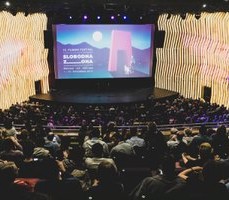 From 5 to 10 November the 16th Free Zone Belgrade Film Festival screened almost 70 engaged art house films in nine movie theatres across Belgrade, Nis and Novi Sad. This year Free Zone collaborated with new venues located outside the city centre of Belgrade. Despite all COVID-measures around 1600 visitors attended these cinema screenings. At the same time, Serbian audiences also had the opportunity to watch 45 feature films and 17 short films via the new VoD platform KinoKauch. This resulted in almost 1900 views. The topic that sparked a lot of interest among the audience was related to the movie Little Girl, by Sébastien Lifshitz, about the challenges faced by transgender children. Radu Ciorniciuc won this year’s Human Rights Award for his documentary film Acasa, My Home.
From 5 to 10 November the 16th Free Zone Belgrade Film Festival screened almost 70 engaged art house films in nine movie theatres across Belgrade, Nis and Novi Sad. This year Free Zone collaborated with new venues located outside the city centre of Belgrade. Despite all COVID-measures around 1600 visitors attended these cinema screenings. At the same time, Serbian audiences also had the opportunity to watch 45 feature films and 17 short films via the new VoD platform KinoKauch. This resulted in almost 1900 views. The topic that sparked a lot of interest among the audience was related to the movie Little Girl, by Sébastien Lifshitz, about the challenges faced by transgender children. Radu Ciorniciuc won this year’s Human Rights Award for his documentary film Acasa, My Home. -
Ukraine – Filma. Feminist Film Festival
23-26 September 2021
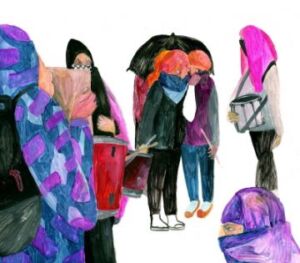 The Filma. Feminist Film Festival in Ukraine was created by a feminist collective as a collaborative platform for films that meet the principles of intersectional feminism, anti-racism, anti-colonialism, inclusion, and a culture of consent. In this first edition, about 16 films will be screened online, including audio description and sign language, followed by in-depth discussions. Filma intends to be an open and inclusive space for debate on human rights, and to inspire and empower local audiences, reaching an expected 2200 visitors. In its programming the festival also focuses on transgender and antiracist activism. The organisation also aims to have a representative of several intersecting marginalised groups in its organising team.
The Filma. Feminist Film Festival in Ukraine was created by a feminist collective as a collaborative platform for films that meet the principles of intersectional feminism, anti-racism, anti-colonialism, inclusion, and a culture of consent. In this first edition, about 16 films will be screened online, including audio description and sign language, followed by in-depth discussions. Filma intends to be an open and inclusive space for debate on human rights, and to inspire and empower local audiences, reaching an expected 2200 visitors. In its programming the festival also focuses on transgender and antiracist activism. The organisation also aims to have a representative of several intersecting marginalised groups in its organising team. -
Venezuela – Miradas Diversas Festival
25 November – 19 December 2020
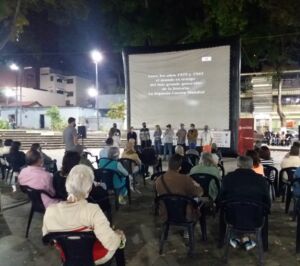 The second edition of the human rights film festival Miradas Diversas took place from 25 November to 19 December 2020 in six Venezuelan cities: Caracas, Barquisimeto, Valencia, Maracaibo, La Asunción and Mérida. In cooperation with many different Venezuelan organisations, Circuito Gran Cine screened a total of 50 feature films and 12 short films, largely via mobile cinema screenings in open air. This way more than 1500 people were reached. As a result of COVID-19 and the closure of cinema halls and other indoor venues, part of the film programme was transferred to online platforms, resulting in another 600 views. Besides, in the programme ‘Conversation on cinema and human rights’ ten Venezuelan filmmakers discussed the meaning, importance and production possibilities of films that address human rights issues.
The second edition of the human rights film festival Miradas Diversas took place from 25 November to 19 December 2020 in six Venezuelan cities: Caracas, Barquisimeto, Valencia, Maracaibo, La Asunción and Mérida. In cooperation with many different Venezuelan organisations, Circuito Gran Cine screened a total of 50 feature films and 12 short films, largely via mobile cinema screenings in open air. This way more than 1500 people were reached. As a result of COVID-19 and the closure of cinema halls and other indoor venues, part of the film programme was transferred to online platforms, resulting in another 600 views. Besides, in the programme ‘Conversation on cinema and human rights’ ten Venezuelan filmmakers discussed the meaning, importance and production possibilities of films that address human rights issues.
Newsletter
Do you want to stay up to date with all Movies that Matter news, promotions and special screenings? Sign up for our newsletter (in Dutch).
Subscribe to our English Industry newsletter or Educational newsletter (in Dutch) here